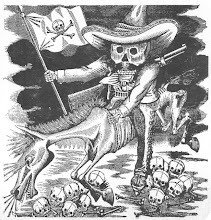Wednesday, July 2, 2008
Kennedy v. Louisiana: I Agree 2 -- More Thoughts
Saturday, June 28, 2008
Kennedy v. Louisiana: I agree.
Thursday, June 26, 2008
Lynchings, Poverty and Executions
Thursday, June 5, 2008
Tricycling Brownsville
On the way back, somewhere along the way, the flag, you know, orange on a tall fiberglass pole, blew away.
Back on the ground in Brownsville, I raised the seat and tightened things up. Kathy insisted I ride around in the parking lot behind the house some before I ventured out. I also dug up an old bicycle cable with a lock on in that belongs to some long since stolen bicycle. I did fine in the parking lot so I ventured out into the larger world, humming the tune from Indiana Jones.
The first problem is car driving in downtown Brownsville is a blood sport and there are extra points for bicyclists. There was no way I could go on the busy streets. The next problem is that tricycles are wider than bicycles and it takes some calculation to make sure I didn't get stuck on a curb.
I soon discovered 8th Street, low traffic and a nice parking area halfway between the state and federal courthouses: a light pole perfect for locking up an adult tricycle. There wasn't a lot of other traffic.
This particular adult tricycle has a basket of a perfect size for my old beat-up leather briefcase.
However, there is the problem of sunburning the top of my bald pate. My usual straw fedora won't stay on with the blazing speed of an adult tricycle. I dug a gimme cap out of the closet that says "Relax" on the front and it seems to work.
The neighborhood kids are also out on their bikes and when I drive by they come out and join me for a couple of blocks. A half a dozen kids on bikes, one pulling another in a sort of bike trailer filled with yet another kid, cruising the wrong way down 8th street. It may appear to be an odd gathering, but outside of inmates, it has become the larger part of my contact with the world.
Jeff tells me this is a good green thing to do, but then he is much more hopeful about life. I just keep thinking how much money I could save if I could raise enough money to be able to afford to sell the car.
Wednesday, June 4, 2008
Pascal's First Three Provincial Letters
I dutifully hopped on the adult tricycle loaned to me by Jeff (the retired syphilis hunter) and peddled over to the Brownsville Public Library. There, the only Pascal available was volume 30 out of the Great Books publication. So I check it out and I also picked up both volumes of the Syntopicon for browsing.
Austin sneers at the reading of interpretations, histories, biographies, etc. from the classic writers, but with hard guys, I tend to read around them a while before I can get up the courage to actually read the book. Sometimes I only read around them and never get to the book.
Saturday, May 31, 2008
Doocing
doocing noun [U/C] /
“I started this website in February 2001. A year later I was fired from my job for
this website because I had written stories that included people in my workplace.
My advice to you is BE YE NOT SO STUPID. Never write about work on the
internet unless your boss knows and sanctions the fact that YOU ARE WRITING
ABOUT WORK ON THE INTERNET.”
Since Armstrong, there have been many notorious cases of people being dooced. Ellen Simonetti was fired from Delta airlines for some hardly racy photographs of herself in an flight attendant uniform in an airplane. Mark Jen was fired from Google for posting comparative pay benefits between Google and Microsoft. Jessica Cutler was a staff assistant from an Ohio Senator who was posting anonymously, but was outed and then fired after she described her ventures into prostitution to augment her meager staff pay.
At this stage there is very little protection for employees of private employers who are not careful and offend their bosses. The larger issues of defamation and disclosure of trade secrets are also being tested by the law. I am interested in the legal developments related to blogging and plan to do a few posts along these lines.
Sunday, May 25, 2008
Pigsmeat Spence and the return of Food Riots
Saturday, May 24, 2008
More on Success--Chesterton
Friday, May 23, 2008
TB and MRSA and Ronald Reagan
Brownsville: Land of the Free
Tuesday, May 20, 2008
Austin's interpretation of "That our happiness must not be judged until after our death."
This is my reading as well. An aside, Uncle Toby: The translation I read is by Donald M. Frame. It is a 20th Century Translation first published in 1957. Mr. Dupin uses Charles Cotton's translation from the late 17th Century. John Florio's translation from the early 17th Century is the one to which I linked yesterday's post. Both Cotton's and Florio's translations are pleasing to the ear. Frame's is easier for me to understand.
Austin, though, tells me I am missing the whole point of the essay. He gives three clues to support his argument: 1. When referring to the Latin, pre-Christian writers, "fortune" is not capitalized, but when referring to the present day, "Fortune" is capitalized. 2. When reaching his conclusion, he notes, "God has willed it as he pleased...." 3. Montaigne notes three (not two or four) execrable and infamous persons whose deaths were ordered and "in every sense composed to perfection." 4. The "by his fall" language echoes the descent into hell of Jesus and other Christian references.
Austin says, we may dismiss one or two of these clues, but at three,we have to pay attention because Montaigne fills his essays with hints of his true intentions. And however much he may love the classics, Montaigne is still very much the Christian.
This, then, is the the argument Austin gives from the hints: "That our happiness must not be judged until after our death" is a rejection of the pagan virtues and an embrace of salvation through Christ. Upon death, the "power and fame" to which we aspire by a career is surpassed by something more grand and glorious than we have desired or hoped.
The pagans before Jesus recognized that "however fortune (small 'f') may smile on them, men cannot be called happy until they have been seen to spend the last day of their lives. The pre-Christian standard is the "state" of the person. If a king is captured and ends up a carpenter or clerk to Rome, his station in life has changed and he cannot be happy.
Today (Montaigne's time) we have Jesus and the present time is indicated when saying, "For it seems that, as storms and tempests are provoked to humble the pride and loftiness of our buildings," so are there "spirits up above" who are envious of grandeurs here below and will wreak havoc on human things and trample all that speaks of human eminence and laugh them all to scorn.
It further seems (again in Montaigne's Christian present tense) that "Fortune (big 'f') sometimes lies in wait precisely for the last day of our life, to show her power to overturn in a moment what she has built up over many years...."
The three execrable and infamous persons are meant to remind us of Jesus and the two thieves on the cross. And the holy trinity. Who but Jesus had a death that was "ordered and in every circumstance composed to perfection?"
By embracing Christian Grace and rejecting the ambitions and designs of man, we can gain a gallant and fortunate death. Through Christ, we may arrive where we "aspired to without going there, more grandly and gloriously" than we had desired or hoped. By our fall we may go beyond the power and the fame to which we had aspired in by our careers.
According to Austin, in this essay, Montaigne answers the question, "Does it matter, this success or failure in life?" with, "No. Success and failure are replaced by something more grand and glorious--the Peace of Christ. This is what allows us when we die to "go well, that is to say quietly and insensibly."
Mr. Dupin also notes that as with the Bible, "improper translation and interpretation can lead to unintended results." This has long concerned me. If Jesus spoke Aramaic, and then His words were written down in Greek and much later translated to English, how am I to rely on what Jesus supposedly said, not speaking or reading Aramaic or Greek?
Neither do I read French. Oh, to be an exegete.
Monday, May 19, 2008
Interpreting Montaigne: Ed's superficial reading of the Essay of judging happiness only after death
Sunday, May 18, 2008
If At First You Don't Succeed, Failure May Be Your Style. Quentin Crisp
R. disputes her conclusion. He sees his life as largely a success and his wife sees it as largely (or completely and totally) a failure. A loss. Not really worth having been lived.
I for one would be willing to declare R. a success on the basis of being a successful father alone. This was Jackie O's definition and she was rich and famous. So R. can accept this definition if he wants. His wife won't, but I'll give it to him. For that matter, it would be easy to make an argument for R. He was elected a member of his city counsel and had many successful law suits that mattered at least to his clients. Somehow, though, I don't think these would weigh much in the wifely judgment day.
I have further assured R. that in my experience, all husbands are sooner or later failures, completely and utterly. I further assured him that Kathy is always asking me, "If you're so smart, why aren't we rich." She throws out the decade that has passed without a vacation. She notes my car always looks like a wreck. My clothes are terrible. My dog is fat and has gas. She grumbles about the 32 inch waist I had when we were married that keeps swinging between 40 and 50 inches. Despite my soaring success in life (as I see it), she is sure I have failed and failed her as well. "I'm worried about my future," she cries.
And it is the same with all of our friends. I mentioned our mutual friends, all of whom are now about sixty and failures in the eyes of their wives. Some have actually saved money, have a nice house, annuities and 401 K plans, but their wives are still wrecks about the declining income and the likelihood of destitution. None of this seemed to comfort R.
Anyway, it is now incumbent upon me to redefine success and failure in such a way that R. and I and all of our friends (who have lived so long and have so little to show for it) are not failures.
Oddly, I don't remember much comment about the subject of failure from philosophers or novelists or poets in my decades of aimless and unproductive reading.
However, I do think when we read a translation of Aristotle and his definition of "happiness," this is something we would now call "success." My hope is that Aristotle can bail out R. and me and all others similarly situated. If we can claim to be a success by Aristotelian standards, this would largely negate being a failure when we are weighed in the wifely balance.
The word we translate as happiness is eudaimonia which breaks down, eu, "good" and daimonia, "spirit." By extension, it refers to good fortune or what we might usually call "success."
Happiness for moderns is subjective. You can take a pill or have whiskey and become happy. For Aristotle, a child could never be happy, because not enough life had been lived. Aristotle grappled with the concept of not calling anyone happy until his death and believed that the life of happiness could be negated even after death. If someone based his life on a project that was merely and illusion and false, this may not be learned until later. The happy life would be erased retroactively even if the dead was oblivious to the failure. If the dead man's son turns out to be a murderer, he will not have been happy.
Even for moderns, these things could be said about success. The apparently successful man might be safely in the grave when his children or his life's work goes on to prove he was a terrible failure.
First what I "remember" Aristotle said, but cannot find. Happiness (hereinafter called success) is achieved with good birth, good health, good land, good children and some other things like good horses.
These things are achieved by practicing the virtues. Political virtue is highly ranked. R. served as a counsel member for the poor area of town and worked to help them get the city services of the richer parts of town. Aristotle would give him high marks for this. I'd say a B or maybe an A-.
Aristotle would also judge success on how money is handled. He ranked liberality and magnificence high. Magnificence is something like giving a park to the city. I doubt R. was able to do much of this, but he always ranked high in liberality. He gave political contributions and attended the arts and bought lunches. Aristotle would probably at least give him a C+. Now this is the sticking point and where his wife probably fails him. In fact, a failure here for most wives seems to outweigh all the other grades. It is heavily weighted in the wifely report card.
Aristotle put a lot of stock in honor as well. I think he was talking about war or other sacrifice. R. probably wouldn't get much there.
Aristotle wanted a balance between ambitions and lack of ambition. R. may have fallen a little heavy in the lack of ambition category. OK, only a D, but it isn't failure.
On the anger/good temper grade, after overcoming a childhood inability to lose at ping pong, he would score very high on the good temper grade. Pushing an A, I would say.
Aristotle also graded success on friendliness, truthfulness and good-wit. R. really should get better than average on all of these. Especially on friendliness and good-wit. I don't know if Aristotle graded on a curve or not, but surely R. should get B's or better.
So, on Aristotle's success report card, I think R. would probably be a success.
How then, should he (and I and all others similarly situated) comfort ourselves on having failed on the wife report card? I say we look to true successes in life like Socrates, Tolstoy, Gandhi. If the biographers are correct, their wives would have given them failing grades as well.
On Clichés
Now for the correction (or the swinging back of the pendulum), I love a cliché.
The wee hours of the morning. I never recall having used the word "wee" in any other context. "The small hours of the morning" says the same thing. About thirty years ago I heard a jury argument in which the lawyer (one Warren Burnett of Odessa, Texas, now forgotten, but lionized by the young lawyers in those days) told the jurors to make a decision that they would not wake up and worry about in the wee hours of the morning. I have now repeated it in jury argument dozens of times.
I associate the phrase in my mind with another phrase, "the drinker's hour." I have understood there is an hour about three in the morning when the alcohol wakes you up again after passing out earlier in the evening. Is this in Malcom Lowry's Under the Volcano? It turns out a musical band of a genre foreign to me (post-grunge?) called a song "the drinker's hour." The Von Ra drinker's hour is 2:35 a.m. Whether we wake up from alcohol or the slings and arrows of outrageous fortune in the wee hours of the morning, it is always something uncomfortable, that a juror does not want to have to do for making a bad decision in deliberation.
We sometimes teach the use of clichés in trial advocacy courses, though no one says it quite like that. The idea is to find a theme the jury will recognize for the trial. Something comfortable and settling like, "A leopard doesn't change its spots" or "If you lie down with dogs, you'll get up with fleas" or "Oh what a tangled web we weave, when first we practice to deceive" or "Don't rush to judgment." Cliché's all, but innovation is not what the law is supposed to do. New law takes a few centuries getting used to.
Journalists and comedians seem to get excited about stealing other people's work, but lawyers do not. It is perfectly OK to get a copy of someone else's final argument and memorize it word for word and then deliver it to the next jury. Pleadings and briefs are often cut and paste (now in the word-processor sense, before, literally). Lawyers don't call it "plagiarism," (unless a client pays to call it plagiarism), we call it "precedent."
Whip of economic necessity. This is a cliché, but it seems in narrow circles. Back when Texas still required insurance companies to actually pay a little bit to workers injured on the job, there was case law that explained someone might have to keep working even after suffering total incapacity because of the whip of economic necessity. If the kids are hungry and you are losing your house, you keep working even if you are hurt. To me, it sounds like a cliché, but an internet search doesn't even produce the phrase.
Slings and arrows of outrageous fortune. Most everything Shakespeare said first is now a cliché. Hamlet used this phrase when deciding whether to commit suicide. Talking about worries, I like "uneasy lies the head that wears the crown" also.
In a final argument I gave in an asbestos case many years ago, I cribbed most of the language from Shylock's speech: "We are people too. Don't we have hands, organs,
dimensions, senses, affections, passions? Aren't we fed with the same food, hurt with the same weapons, subject to the same diseases, healed by the same means,
warmed and cooled by the same winter and summer? If you prick us, do we not bleed?
if you tickle us, do we not laugh? if you poison us, do we not die?" Something along that line. I didn't give credit, foolishly believing it would be obvious. Later the court reporter told me that the asbestos company's defense lawyers and later a national network of asbestos defense lawyers had been ordering the transcript from all around the country to decide how to answer it. For a while it was entertaining watching the asbestos defense bar, always stump ignorant, trying to debate Shylock. (Ultimately, through the clever misuse of bankruptcy laws the answer was much like that in the play: "We have the political power, so you little people sooner or later lose, no matter how clever you think you are.")
Stump ignorant. Because I have not yet been called out on it, I don't yet consider this a cliché, but merely a very clever thing I say. Now for the confession: I think I read that phrase in a Thornton Wilder novel--The Eighth Day, maybe. "Why would you do that," he asked. "Well, because I don't want to live and die stump ignorant," he answered sagely.
Saturday, May 10, 2008
Cameron County Can't Afford Death Penalty Prosecutions
North Carolina estimated that that an execution costs $2.6 million more than a non-death murder case. Florida says $3.2 million per prosecution, but the average cost of those executed has averaged out at $24 million. Californians have paid more than a quarter of a billion for each of the state's eleven executions.
The Dallas Morning News estimates that each Texas death penalty case costs an average of $2.3 million.
The trial alone involves a hefty increased fee. The State of Kansas estimated $508,000 per capital case more than plain vanilla murder. The State of Washington said it was $470,000 on top of the costs for another type of murder. Washington also estimated as much as an additional $70,000 for court personnel and $100,000 for appeal.
In a February 4, 2008 article in the New Yorker Magazine called Death In Georgia: The high price of trying to save an infamous killer’s life by Jeffrey Toobin, the author describes a trial in which the entire indigent defense budget of the county of $1.2 million was exhausted before the first juror was picked. The case had to be put on hold until more money could be found.
Cameron County has charged about 100 people with capital murder according to an i-docket count. These cases appear to go back about ten years.
I recently requested a count of the number of pending capital prosecutions in Cameron County. The number is an extraordinary 18 cases with two on death row.
With even a conservative price of, say, $2 million per execution and Cameron County proposes to execute all twenty of these people, the price will be about $40 million. I am not accountant, but this looks to me like it is impossible with Cameron County's budget.
Nor am I very good at reading budgets, but it appears that the Cameron County's 2008 is $111 million. The indigent defense budget is located in two places. One is for personnel in the amount of $199,000, down from $223,000 in 2007 and the other from a General Fund in the amount of less than $900,000. My guess is the second number represents the approximately $6,000 per month per court for contract attorneys and appointments and the first number is court personnel who run the system, but I welcome correction and explanation from the numbers crunchers among you, Readers True.
Assume that no new capital indictments are issued and the costs of the 20 now targeted for death is spread out over five years, that is still $8 million per year. The entire cost of the jail for 2008 is only about $4 million. The district courts are $2.4 million a year. The County Courts at Law run $1.5 million.
In other words, to truly prosecute and defend this many capital cases, the expense would be greater than the entire criminal and civil justice system in Cameron County. We would need to shut down the jail and all the courts to be able to fund the prosecutions, but of course then we would have no place to put or try the capital inmates. Either that or cut into indigent health care, burials and road crews.
So if the numbers are impossible, how is it that Cameron County is pretending to prosecute 18 pending capital cases with two on death row. I have a couple of guesses. One is that many of these 18 shouldn't be capital cases at all and will be reduced, but only after small fortunes are spent to pretend they are capital cases for a while. Another is that the judges will try to defend these cases without spending this much money.
Every old-time criminal lawyer has a story about how he was made to take a capital case, worked on it for months or years and then either not paid or paid a pittance. Other horror stories abound of expert witnesses who were stiffed. Differently put, the county pretended to pay for the defense of capital cases, but did not. So the quality of justice was low, which means in in a capital case that the risk of executing the innocent was high.
The law has changed in the last few years so that if the lawyer falls asleep in the course of the trial of a capital case or the trial judges refuse to pay for needed expert witnesses, the cases will be reversed and sent back to be tried again. For a defense to be constitutional, every defendant must have a mitigation specialist thoroughly investigate the background of the defendant and present that information at trial to support life rather than death. He must have a psychologist on the trial team. He must be able to investigate the facts and have experts who can analyze the physical evidence. He must have parity with the state in resources.
As far as I can tell, these minimum requirements have not been met in the past. Under these conditions, if things are not done better now than they were before, Cameron County may produce some death penalty convictions, but they won't be legal.
We will enter into an endless cycle of cheap, illegal trials that have to be redone because no one has the political will to require that indigent capital defendants receive a defense that meets minimum requirements of the constitution. Because of lawyer errors, we will likely get some executions, but we won't really know if the people being executed are guilty.
We pay a high price for cheap justice.
Thursday, May 8, 2008
Some Thoughts About Contempt
A friend gave me the audiotapes of Blink, the Power of Thinking Without Thinking by Malcomb Gladwell. Gladwell reviews the research of Paul Ekman, beginning with Ekman's teacher Silvan Tomkins.
Tomkins was said to have the capacity to look at faces and describe moods to a level that appeared to be mind reading. Ekman lacked the innate ability, but broke the face down into a measurable coding system.
Now there is a certification in the reading of faces. After a five day workshop and 45 hours of study, applicants are eligible for a test to be certified as a FACS coder. The advertisement for the workshop says, traditionally, the information is learned with 100 hours of self-study of the 500 page FACS manual.
This study seems to largely be the realm of clinical psychologists. Gladwell describes the use of the system to quickly judge couples to see who will stay married. The single most important factor in judging the relationship is the expression of contempt.
Darwin describes the emotion in The Expression of the Emotions in Man and Animals: Scorn and disdain can hardly be distinguished from contempt, excepting that they imply a rather more angry frame of mind. Nor can they be clearly distinguished from the feelings discussed in the last chapter under the terms of sneering and defiance.... Nevertheless, extreme contempt, or as it is often called loathing contempt, hardly differs from disgust."
Darwin describes how contempt is shown: The most common method of expressing contempt is by movements about the nose, or round the mouth....
The artist Faigin describes "disdain," which Darwin views as angry contempt. Disdain is expressed in the mouth. The upper lip is raised and flattened in a sneer-- the lip is squared-off in shape. Slight sneer is often asymmetrical with one half of the upper lip active and the other half relaxed. The lower lip is neutral. The signature wrinkle is the nasolabial fold (deepest alongside the nose). The eyebrows and eyes are relaxed.
Contempt is a seventh emotion that Ekman recognized as a universal emotion after developing the original six: anger, fear, disgust, happiness, sadness, surprise. The contempt expression is expressed in FACS terms is still being debated by the researchers. They seem to agree it includes AU 12 and 14, but the issue is whether AU 10 is also included. AU 12 is the common smile expressed with the zygomatic major. AU 14 dimples the cheeks with the buccinator muscle. These alone look a lot a smile. Adding AU 10 which uses the levator labii superioris to raise the upper lip, is the quick change in the smile that shows contempt.
Contempt can be largely masked except for a fleeting lapse into the hostility exhibited with the raising of the upper lip. The psychologists film the expressions and then slow them down in able to spot and measure AU 10.
If it is true that contempt is the measure of why relationships fail, this is a valuable fact for making our ways through this hard life.
One of my philosophy teachers in college at UT was Robert Solomon. He wrote a book called Emotions and the Meaning of Life in which he defines contempt as the last of a continuum of resentment and anger. According to Solomon the differences between the three emotions are that:
1. Resentment is directed toward a higher status individual.This would give a suggestion that the reason marriages fail (as signaled by the expression of contempt) is that one of the partners believes the other is a lower status individual.
2. Anger is directed toward an equal status individual.
3. Contempt is directed toward a lower status individual.
David Hume compares respect and contempt (click the title). Contempt arises when we do not merely observe the "qualities and circumstances" of others, but we "make a comparison betwixt them and our own qualities and circumstances."
Hobbes says "Contempt is when a man thinks another of little worth in comparison to himself."
Built into contempt, then, is the need to not merely observe, but pass judgment on others.
The inferior position implied by contempt is described by Edmund in King Lear:
I will preserve myself: and am bethought
To take the basest and most poorest shape
That ever penury, in contempt of man,
Brought near to beast: my face I'll grime with filth;
Blanket my loins: elf all my hair in knots;
And with presented nakedness out-face
The winds and persecutions of the sky.
Tuesday, May 6, 2008
Some Brief Notes About Hell
I can remember being asked once to draw heaven in a Bible school class. I drew a picture of someone climbing up a hill and then sliding down only to begin again. My thought was that the greatest pleasure in life was achieving something (I suspect the thought was more in Bible school age language) and so heaven must be the continued effort without it really mattering if you got anywhere or not.
Only later did I hear about the the Greek myth of King Sisyphus who for eternity was required to push a boulder up a hill in tartarus, the hellish part of the Greek's underworld, only to see it roll down again.
My childhood drawing of heaven looked a lot like the Greek's conception of hell. Back to the drawing board.
From childhood sermons I had heard of a hell of fire and brimstone. Later I read Jonathan Edward's sermon, "Sinners in the hands of an angry God:"
The God that holds you over the pit of hell, much as one holds a spider, or some loathsome insect over the fire, abhors you, and is dreadfully provoked: his wrath towards you burns like fire; he looks upon you as worthy of nothing else, but to be cast into the fire; he is of purer eyes than to bear to have you in his sight; you are ten thousand times more abominable in his eyes, than the most hateful venomous serpent is in ours.I wasn't sure I could swallow that idea of God or hell, but the language still holds me spellbound.
When I read Dante's Inferno in college, my imagination of the sophistication of hell increased. I was particularly struck by the varieties of hell for different types of sinners. Also, I had never thought of Satan in a frozen center, so that was fun. A couple of years ago, I read a murder mystery, The Dante Club, by Mathew Pearl. I enjoyed it and also enjoyed revisiting various types of Dante's punishments. It features Longfellow, who by the way, wrote some of my favorite translations of Spanish literature.
Milton's hell seemed like a great adventure for me. I read Paradise Lost in college. I was of an age when the adventure of being in hell plotting a revenge against heaven was much more appealing to me than Milton's paradise. I agreed with the proposition: To reign is worth ambition though in Hell: Better to reign in Hell, then serve in Heav'n.
I also read about Sartre's hell being other people in "No Exit." It did not hold me spellbound.
For some reason, I have been fascinated by the contemplation of hell. It makes me feel better, but I am not sure why. I know my conception of hell is simple, simple, simple. Maybe, as I approach that seventh decade, I should think more deeply about the subject.
Sunday, May 4, 2008
Thoughts about dying and death
Montaigne (the Granddaddy of All Bloggers, GOAB) makes this point in his Of Practice. We can gain a proficiency through practice in all other human tasks, "But for dying, which is the greatest task we have to perform, practice cannot help us. A man can, by habit and experience, fortify himself against pain, shame, indigence, and such other accidents; but as for death, we can try it only once: we are all apprentices when we come to it."
Montaigne then describes an incident in which he was knocked off his horse by a bigger horse and rider. "It is the only swoon I have experienced to this day," he relates. He didn't think the experience of being close to death, at first, was that bad: "It seemed to me that my life was hanging only by the tip of my lips; I closed my eyes in order, it seemed to me, to help push it out, and took pleasure in growing languid and letting myself go. It was an idea that was only floating on the surface of my soul, as delicate and feeble as all the rest, but in truth not only free from distress but mingled with that sweet feeling that people have who let themselves slide into sleep."
Later he started throwing up clots of blood. And then after two or three hours he began to feel himself caught up in the pains, he says, "...my limbs being all battered and bruised by my fall; and I felt so bad two or three nights after that I thought I was going to die all over again, but by a more painful death; and I still feel the effect of the shock of that collision."
Montaigne in another essay, Judging the death of others, says being dead is not what troubles us, but dying. He quotes (someone completely unknown to me) Epicharmus: "It is not death, but dying, that I fear.
When Caesar was asked what death he found most desirable, he answered (again according to GOAB), "The least premeditated and the quickest." And Pliny, "A quick death is the supreme good fortune of human life."
I have thought that an easy death for me would be by drowning. I once suggested to Kathy that if I fall into senility, she take me to the beach, point out to sea, and tell me to swim to an island paradise. (She wanted to know if it would work right then.)
When I described this plan as an easy death to Brownsville Blogger Stan Raines, he gave me a book of poems he had written, There's More to Blues Than Meets the Eye. One of his poems, The Sea, begins:
When I have reached sufficient age
And experience has filled me up
And the world has drained me dry
I will heed god's call and take me to the sea.
It might be a far worse death than Stan or I imagine, but I had an experience when I was in college that makes me think it might not be the worst of all. I, then, fancied myself the greatest of under-water swimmers. I could take several deep breaths and swim from a lakeside restaurant in Lake Travis to a ski ramp near the other side of the lake. Though, we never did, there was some discussion of taking bets on the matter.
Once, in a pool, with my friends Dan Boyd and Stephen McNally present, I was going to put on a demonstration. I was going to swim laps in the pool far beyond anyone's expectations and to universal amazement and admiration. I did. However, at some point I stopped swimming and began to sink. The only thing I remember was Stephen pulling me out and telling me that my competitive spirit was in conflict with the likelihood I would enjoy a long life.
That wasn't so bad. I lost consciousness and it may have been I would have been unaware of the dying part and gone straight to the death. I'm glad it didn't happen then, and I don't want it to happen any time soon, but, Lord, may I be blessed with an easy way out.
Sherwin B. Nuland is a favorite writer of mine on death. One way to judge a book is to look at the index. If it quotes Montaigne, it's a keeper. Nuland, a surgeon from Yale, in his book How we Die, quotes Montaigne twice. (He also quotes Tolstoy, Shakespeare and Laurence Sterne. What a guy.)
Lawyers don't have to see much death, but some of us must hear many very good descriptions of death. Nuland, on the other hand wrote about death after seeing it at close hand over a long career. He says he would like to have a death without suffering, but the overwhelming odds are against it: "Like most people, I will probably suffer with the physical and emotional distress that accompany many mortal illnesses, and like most people I will probably compound the the pained uncertainty of my last months by the further agony of indecision--to continue or to give in, to be treated aggressively or to be comforted, to struggle for the possibility of more time or to call it a day and a life--these are the two sides of the mirror into which we look when afflicted by those illnesses that have the power to kill."
So I will be most likely trapped as well. Stretching out the agony with the hope of recovery or at least a little more time.
Nuland reminds us of the words Shakespeare gives to Julius Caesar:
Of all the wonders that I have yet heard,
It seems to most strange that men should fear;
Seeing that death, a necessary end,
Will come when it will come.
Friday, May 2, 2008
Supporting the Northern Wall
Tancredo went to Miami and declared it a Third World Country. He compared his reception to that he would have received in Havana and talked about the "thugs" who opposed him.
So Brownsville got off light in the Tancredo mauling. Tancredo's level of viciousness is unusual for someone holding public office, but it is certainly not new to the American scene.
I remember undisguised fear, hatred and bigotry even as a child in McAllen. It was just OK to tell the Jewish kids that they had to answer for killing Jesus. It was also OK to speak openly about the laziness and tendency to steal that was part of the Mexican character. Racist jokes and skits were part of Church entertainment. We did not see any African-Americans, but where they fit in this scheme was clear.
I had little trouble assuming that I was most likely superior to a Mexican or a Jew. I heard this in polite society. Some of the kid's parents talked about these things. Not usually when a Mexican or a Jew was around, but when it was just us, then it was fine. It would not have been wrong if we were not among ourselves, just impolite.
This was not universally true. A visiting preacher talked about the song, "Jesus loves the little children, all the children of the world, red and yellow, black and white, they are precious in his sight, Jesus loves the little children of the world." He had been a missionary where there were children red or yellow or black or brown and he didn't like this racism. The parents were polite to him too, but there was discussion that he had "gone a little native" with all the time he had spent in other countries.
It would also turn ugly. We had fights based on race. The older students bragged about driving into the Mexican part of town with a blank pistol to shoot at people point blank out of the car window just to enjoy their fear.
There is no reason to believe Tancredo himself would ever be a vigilante. He has the mantle of respectability and at a certain level of power, it is easy to keep your hands clean.
But the vigilante man is fixture of the American landscape. Modern so-called "minutemen" organizations guarding the border in their lawn chairs and coolers are not yet particularly menacing, but they can get there. Tancredo went out and told the forming minutemen organization that they were "genuine American heroes."
Writer and historian Mike Davis in his collection of essays, In Praise of Barbarians:
The vigilantes are back. In the 1850's they lynched Irishmen; in the 1870's they terrorized the Chinese; in the 1910's they murdered striking Wobblies; in the 1920's they organized "Bash a Jap" campaigns; and in the 1930's they welcomed Dust Bowl refugees with tear gas and buckshot. Vigilantes have been to the American West what the Ku Klux Kan has been to the South: vicious and cowardly bigotry organized as a self-righteous mob.
Davis describes Tancredo's genuine American heroes:
In any event, they turned out 150 sorry-ass gun freaks and sociopaths who spent a few days in lawn chairs cleaning their rifles, jabbering to the press, and peering through binoculars at the cactus-covered mountains where several hundred immigrants perish each year from heatstroke and thirst.... Confronted with the Minutemen and the hundreds of extra border patrol sent to keep them out of trouble, campesinos simply waited patiently on the Sonora side for the vigilantes to get sunburned and go home.
The Minutemen had apparently imported themselves for their show. The greater danger arises when the local interests get riled. Steinbeck describes the process like this:
Men who had never been hungry saw the eyes of the hungry....They said, "These goddamned Okies are dirty and ignorant. They're degenerate, sexual maniacs. These goddamned Okies are thieves. They'll steal anything. They've got no sense of property rights."
And then:
The local people whipped themselves into a mould of cruelty. Then they formed unites, squads, and armed them--armed them with clubs, with gas, with guns. We own the country. We can't let these Okies get out of hand.Perhaps the story that King Christian X of Denmark donned the Star of David to protect the Jews of Denmark is apocryphal. But the idea is solid. If the City of Brownsville were to build even a short and inexpensive wall north of the city, we could give a concrete repudiation to Tancredo.
An Eye For an Eye
Once the reminder is given, I believe I am expected to say, "Oh yes, you are right. How could I have been so foolish. That's right, "an eye for an eye." And then I will change my mind about whatever silliness I had said before and the world is properly ordered again.
"Eye for an eye" comes out of Exodus. God has led the Israelites out of Egypt, but they need some rules to govern themselves. First, God gives the Ten Commandments. Then He tells Moses that there are rules Moses must give to the Israelites.
"If someone buys a male Hebrew slave, the master has to let him go in seven years, unless the slave loves the master then the master can pierce the slave's ear with an awl and the slave will serve for life."
"If someone curses or strikes his father or mother, he will be put to death."
"When a slave-owner strikes a male or female slave with a rod and the slave dies immediately, the owner shall be punished. But if the slave survives for a day or two, there is no punishment; for the slave is the owner’s property."
And then if people are fighting they injure a pregnant woman, and she only has a miscarriage, but no other injury, they have to pay her husband a fine, but if there is other injury (apparently to the injured pregnant woman). "If any harm follows, then you shall give life for life, eye for eye, tooth for tooth, hand for hand, foot for foot, burn for burn, wound for wound, stripe for stripe."
Moses then goes on with some other rules:
"If a thief is found breaking in, and is beaten to death, no blood-guilt is incurred; but if it happens after sunrise, blood-guilt is incurred."
"When a man seduces a virgin who is not engaged to be married, and lies with her, he shall give the bride-price for her and make her his wife."
"You shall not permit a female sorcerer to live."
"Whoever lies with an animal shall be put to death."
Then there are a couple that I like that are seldom mentioned:
"You shall not wrong or oppress a resident alien, for you were aliens in the land of Egypt."
"If you lend money to my people, to the poor among you, you shall not deal with them as a creditor; you shall not exact interest from them. "
Differently put, even for the time the laws of the Israelites were given, it is a little difficult to expand this law to include killing all those people in Hiroshima and Nagasaki. When God destroyed Sodom and Gomorrah, he got all of the innocent people out first.
Some of us aspire to be, or pretend to be, or think we are followers of the teachings of Jesus. What did Jesus make of this eye for an eye?
Jesus' words parallel those of Moses. Instead of the Ten Commandments, He gives the Beatitudes. Then Jesus states a series of laws and provides for a different reaction to the law that goes beyond the law and provides for mercy. In particular about the "eye for an eye," He says:
You have heard that it was said, “An eye for an eye and a tooth for a tooth.” But I say to you, Do not resist an evildoer. But if anyone strikes you on the right cheek, turn the other also; and if anyone wants to sue you and take your coat, give your cloak as well; and if anyone forces you to go one mile, go also the second mile. Give to everyone who begs from you, and do not refuse anyone who wants to borrow from you.
As Gandhi suggested, "An eye for an eye will make the whole world blind."
It seems to me the complete statement when using "an eye for an eye" as an argument for retaliation should be something like this:
"I know Jesus fulfilled this law of retribution by providing for a higher law of love and mercy. I know He said the only true law was to Love God and Love Other People. I know He said not to resist an evil doer. But I don't accept Jesus' teachings. He is wrong about these things. My sense of justice says that Jesus may even be immoral or crazy for suggesting such a thing. I want to go back to the law Moses, and at least if a pregnant woman is injured when people are fighting we should knock out the eye of anyone who knocks out her eye. And we should kill all the witches."


























_-_Dante_And_Virgil_In_Hell_(1850).jpg)






















































